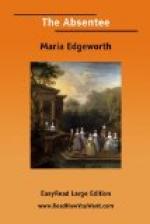‘Just come from him.’
‘How does your business prosper! I hope as well as mine.’
A history of all that had passed up to the present moment was given, and hearty congratulations received.
‘Where are you going now, Sir James?—cannot you come with us?’ said Lord Colambre and the count.
‘Impossible,’ replied Sir James;—’but, perhaps, you can come with me—I’m going to Gray’s, to give some old family diamonds, either to be new set or exchanged. Count O’Halloran, I know you are a judge of these things; pray, come and give me your opinion.’
‘Better consult your bride elect!’ said the count.
‘No; she knows little of the matter—and cares less,’ replied Sir James.
‘Not so this bride elect, or I mistake her much,’ said the count, as they passed by the window and saw Lady Isabel, who, with Lady Dashfort, had been holding consultation deep with the jeweller; and Heathcock, playing PERSONNAGE MUET.
Lady Dashfort, who had always, as old Reynolds expressed it, ’her head upon her shoulders’—presence of mind where her interests were concerned—ran to the door before the count and Lord Colambre could enter, giving a hand to each—as if they had all parted the best friends in the world.
’How do? how do?—Give you joy! give me joy! and all that. But mind! not a word,’ said she, laying her finger upon her lips—’not a word before Heathcock of old Reynolds, or of the best part of the old fool,—his fortune!’
The gentlemen bowed, in sign of submission to her ladyship’s commands; and comprehended that she feared Heathcock might be off, if the best part of his bride (her fortune, or her expectations) were lowered in value or in prospect.
‘How low is she reduced,’ whispered Lord Colambre, ’when such a husband is thought a prize—and to be secured by a manoeuvre!’ He sighed.
‘Spare that generous sigh!’ said Sir James Brooke; ‘it is wasted.’
Lady Isabel, as they approached, turned from a mirror, at which she was trying on a diamond crescent. Her face clouded at sight of Count O’Halloran and Lord Colambre, and grew dark as hatred when she saw Sir James Brooke. She walked away to the farther end of the shop, and asked one of the shopmen the price of a diamond necklace which lay upon the counter.
The man said, ’He really did not know; it belonged to Lady Oranmore; it had just been new set for one of her ladyship’s daughters, who is going to be married to Sir James Brooke—one of the gentlemen, my lady, who are just come in.’
Then, calling to his master, he asked him the price of the necklace; he named the value, which was considerable.
’I really thought Lady Oranmore and her daughters were vastly too philosophical to think of diamonds,’ said Lady Isabel to her mother, with a sort of sentimental sneer in her voice and countenance. ’But it is some comfort to me to find, in these pattern-women, philosophy and love do not so wholly engross the heart, that they “feel every vanity in fondness lost."’




